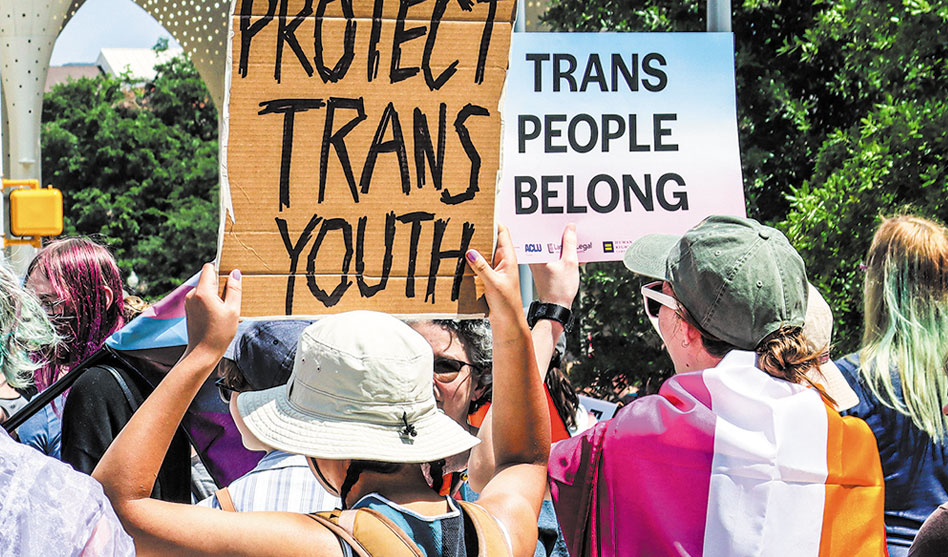Transgender advocates have staged several protests at the Texas Capitol during this legislative session demanding that lawmakers protect trans kids instead of attacking them. (Photo by Tammye Nash)
Bill banning gender-affirming care for trans minors sent to Abbott; advocates pledge legal challenge
DAVID TAFFET | Senior Staff Writer
taffet@dallasvoice.com
Legislation banning doctors from treating transgender adolescents with hormones or puberty blockers — the kind of gender-affirming care backed supported by the World Health Organization, the American Academy of Pediatrics, the American Psychiatric Association and numerous other medical associations and individual physicians — has been sent to Gov. Greg Abbott for his signature. And advocates for trans youth have pledged to file legal challenges to the measure as soon as it is signed into law.

Leslie McMurray
Senate Bill 14 passed the Texas House of Representatives on its first reading by a vote of 92-28 on Friday, May 12, after House Democrats were able to delay that initial vote twice by calling points of order over language in the bill. Seven amendments were proposed, and one of them was adopted, with four Democrats voting for the measure.
After final House approval on Monday, the bill was sent back to the Senate which, late on Wednesday, May 17, approved it as amended by the House and sent it on to Gov. Greg Abbott’s desk for his signature.
The four Democrats were state Reps. Harold Dutton and Shawn Thierry of Houston, Abel Herrero of Robstown and Tracy King of Batesville. The Meyerland Area Democrats voted this week to censure Thierry for her vote on SB 14, saying that she “campaigned on being an ally to the LGBTQ+ community, yet she has supported legislation which will harm this community and doesn’t align with Democratic principles.”
The action has no effect other than the loss of support by an active group of block walkers and fundraisers in her district.
Thierry claimed that after researching the issue, she had decided that the best way to help children suffering from gender dysphoria and depression was to vote against gender-affirming healthcare recommended by most physicians.
Speaking on the House floor, Thierry said, “As they navigate through the challenging journey of finding the best version of themselves, after listening to the debate today, I absolutely believe we should raise the age to 18 for children to receive GnRH analogs, cross-sex hormones, and to undergo potential irreversible body altering surgeries.”

Shelly Skeen
As transgender advocates have pointed out time after time, “potential irreversible body altering surgeries” are not part of gender-affirming healthcare for trans minors, and potentially life-saving puberty blockers are of little use once a trans youth has already gone through puberty.
Minors already receiving hormonal therapy or puberty blockers would have to be weaned off them in “a medically appropriate manner” if and when SB 14 is signed into law. The problem is, the medical community agrees, that there isn’t a medically appropriate manner to wean youth off therapies that are medically indicated.
State Reps. Julie Johnson, Ann Johnson and Mary Gonzalez spoke against the bill. Julie Johnson got bill author Rep. Tom Oliverson to admit that stopping treatment abruptly would be medically inappropriate.
Mary Gonzalez is the lawmaker who brought up points of order that got the bill sent back to committee twice.
The governor has line item veto power and can strike any amendment before signing the bill. Once signed, the lawtakes effect on Sept. 1.
Unconstitutional
Lambda Legal attorney Shelly Skeen said this week that SB 14 is unconstitutional and that she expects legal challenges to be filed as soon as it is signed by Abbott.
Spokespeople for American Civil Liberties Union of Texas, the ACLU, Lambda Legal and Transgender Education Network confirmed early Thursday, May 18, “to file a lawsuit against a sweeping new law banning transgender youth from accessing medically necessary health care that the Texas Legislature just sent to the governor’s desk.”
Skeen said the bill violates equal protection because “It carves out a subset of youth.” She explained that the exact same treatments available to other adolescents will no longer be available to those diagnosed with gender dysphoria under SB 14.
For example, if an adolescent needs a boost to start puberty or is having trouble with their period, they are treated with hormones. And if a youth is suffering from precocious puberty or is fighting certain cancers, they are treated with puberty blockers. And while surgery is not being performed on trans adolescents no matter what they want, the law allows surgeries on intersex kids without their permission.
“The bill specifically excludes one set of the population and says, ‘You are not entitled to this care,’” Skeen said.
Another constitutional argument is the violation of due process that gives parents the right to raise their kid as they see fit. When a parent seeks out scientifically-proven, age-appropriate, best-practice, medically-necessary care, and doctor, parent and child agree to proceed with that care, the state doesn’t have a right to interfere with treatment, according to due process.

State Rep. Shawn Thierry
Lambda Legal, the ACLU and Human Rights Campaign have already filed lawsuits on these grounds against similar laws passed in Arkansas, Alabama, Missouri, Montana, Oklahoma and Tennessee. The anti-trans laws passed in those states have been enjoined while litigation proceeds.
A severability clause has been added to SB 14. If an injunction is placed against just one part of the law, it would allow the rest of it to take effect. Skeen said she believes in this case, any injunction would have to apply to the entire piece of legislation.
According to the Trevor Project, 56 percent of transgender and nonbinary youth in Texas seriously considered suicide in 2022, and 20 percent attempted suicide. Those numbers are up compared to previous years and correspond to the increase in anti-trans rhetoric by politicians.
Further, 78 percent of trans and nonbinary youth experienced anxiety, and 66 percent experienced symptoms of depression.
By ignoring those numbers, the Legislature is putting lives at risk, advocates for transgender youth say.
Additional pieces of legislation that will harm the lives of LGBTQ people are on the floor of the House. Calling your legislator can make a difference. Rep. Thierry, in defending her vote for SB 14, said calls to her office supported the bill.
Impact
Although the new law won’t go into effect until the beginning of September, the debate on treating trans youth and threats from the attorney general have already had an impact on treatment.
The Texas Tribune reports that Dell Children’s Medical Center in Austin has already discontinued trans healthcare for teens. The hospital announced that the doctors who staffed the clinic left after Texas Attorney General Ken Paxton announced an investigation into illegal activity at the hospital.
The threat was made in reaction to a video that includes a social worker at the hospital saying Dell provides gender treatment to patients as young as eight and, at times, after just one consultation.
One parent who spoke to The Texas Tribune reported that her 12-year-old daughter received puberty blockers after more than a year of consultation and was due for another treatment later this month. Instead, she got a call from the clinic telling her that her child’s doctor left Dell and that the appointment was canceled.
The hospital provided mostly out-of-state resources, and, unless they can get an appointment elsewhere, the teen will have to stop their medication cold turkey. The mother said
the closest places providing the necessary care are booked for months.
In Dallas, the clinic run by Dr. Ximena Lopez at Children’s Hospital was closed by the hospital until Lopez got an injunction allowing her to continue providing medical care to
existing patients. Lopez has lost part of her staff, and she has a lawsuit pending against the hospital.
Resource Center Transgender Education and Advocacy Coordinator Leslie McMurray said she wasn’t surprised about the anxiety, depression and suicide levels reported by the
Trevor Project. She said that as a teen, if she knew there were medications she could take to give her the puberty and adolescence she desired, but then that option had been taken from her, she doesn’t know what she would have done.
But she said she does know one thing: “When kids lose hope, that’s when bad things happen.”


GOOD! If you have to be 18 to vote or buy a gun, or 21 to drink alcohol, you should also be 18 to get a sex change. The people pushing children to go through “transition” are sick and should be punished.